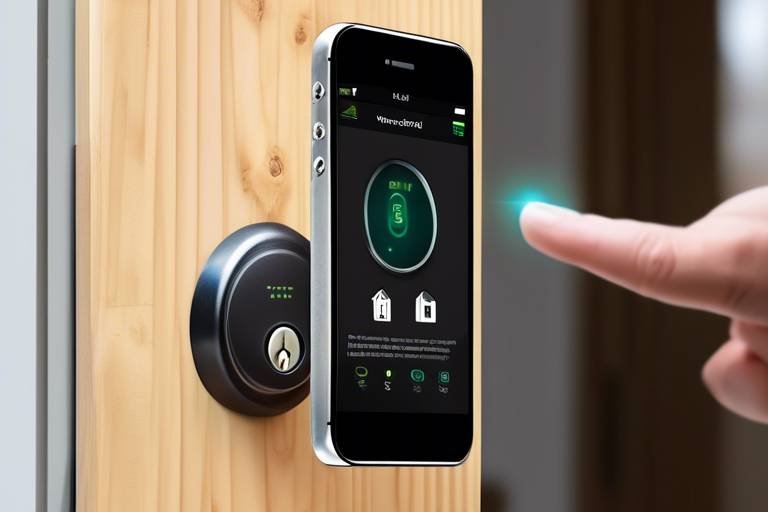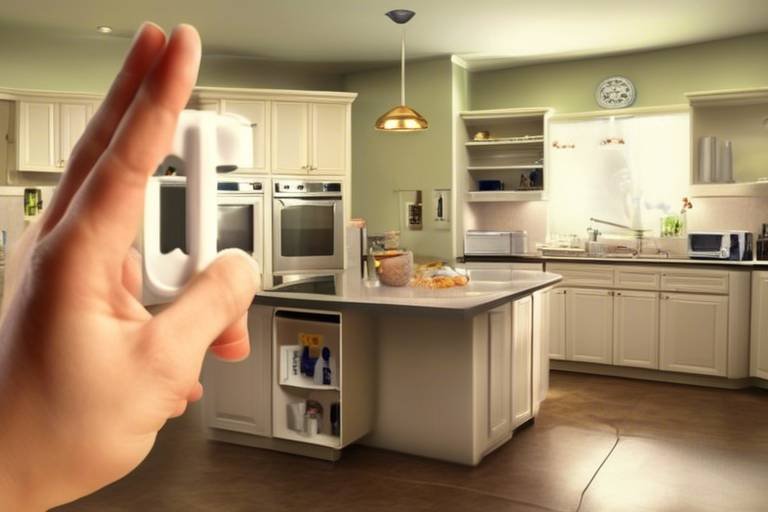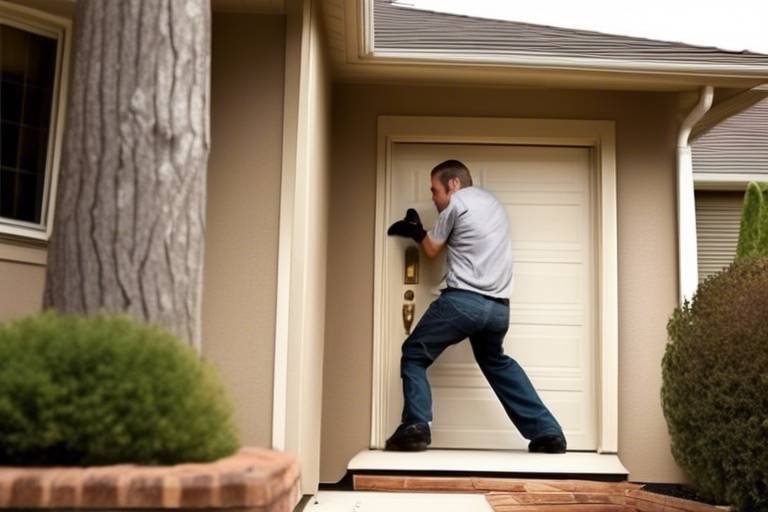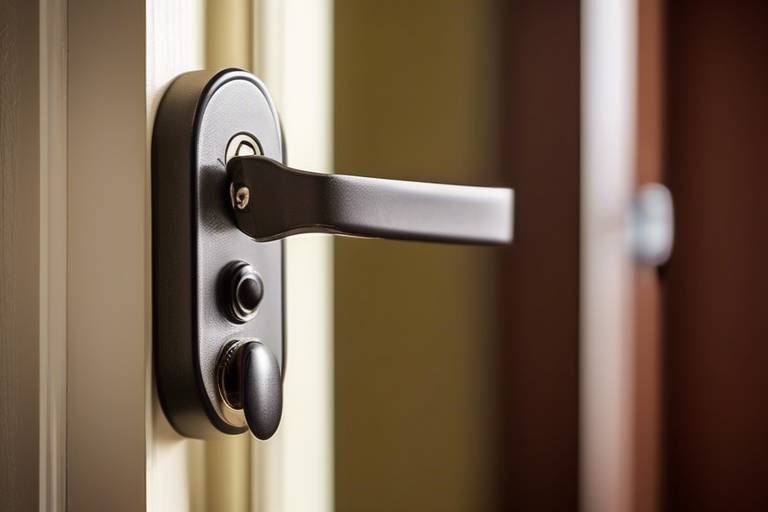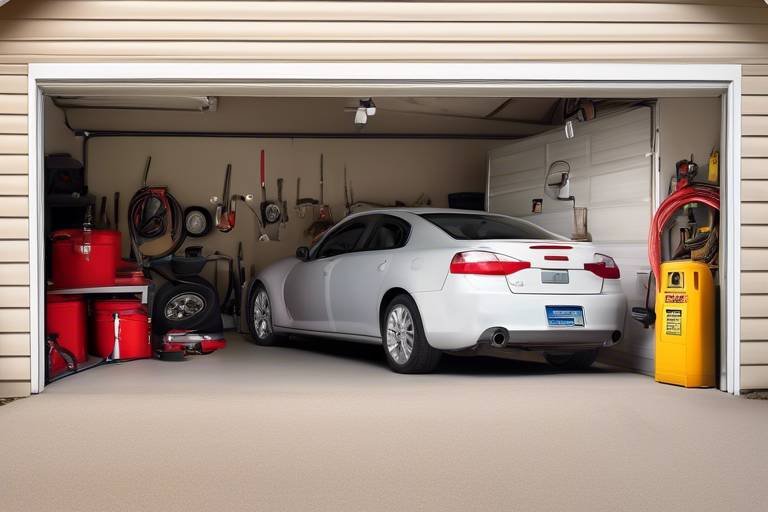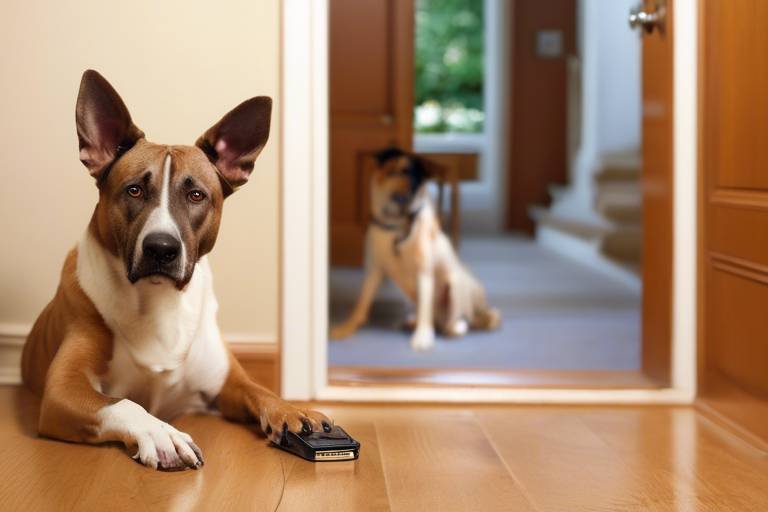Smart Locks – the Future of Home Security
In today's fast-paced digital world, the concept of home security has undergone a remarkable transformation. Gone are the days when a simple key and a traditional lock sufficed to keep our homes safe. With the advent of smart locks, homeowners now have access to a new realm of security that combines cutting-edge technology with unparalleled convenience. Imagine being able to unlock your front door with just a tap on your smartphone or using your fingerprint to gain access to your home. This is not science fiction; it's the reality of smart locks. These innovative devices not only enhance security but also cater to the evolving needs of modern living.
The evolution from conventional locks to smart locking systems highlights a significant shift in consumer expectations. As society becomes increasingly interconnected, people are seeking solutions that not only protect their homes but also simplify their lives. Smart locks are at the forefront of this movement, offering features that extend beyond mere locking mechanisms. They integrate seamlessly with our daily routines, making home security more accessible and user-friendly than ever before.
As we delve deeper into the world of smart locks, we'll explore their numerous benefits, the technology that powers them, and the challenges that come with this new wave of security. Whether you're a tech enthusiast or a homeowner looking to upgrade your security system, understanding smart locks will empower you to make informed decisions that enhance your home’s safety.
Home security has transformed significantly over the years, evolving from simple wooden doors and metal locks to sophisticated electronic systems that can be controlled from anywhere in the world. In the early days, locks were primarily mechanical, relying on physical keys to secure homes. But as technology advanced, so did the methods of protecting our spaces. The introduction of electronic locks marked a pivotal moment in home security, allowing for greater flexibility and control.
With the rise of the internet and smart home technology, we are now witnessing the emergence of smart locks. These devices not only offer traditional locking mechanisms but also incorporate features such as remote access, real-time monitoring, and keyless entry systems. The shift from physical keys to digital solutions reflects a broader trend towards automation and convenience in our lives. Today’s consumers demand solutions that are not only secure but also fit seamlessly into their busy lifestyles.
Smart locks offer numerous advantages that make them a popular choice for modern homeowners. One of the standout features is keyless entry, which eliminates the hassle of carrying physical keys. Imagine never having to fumble through your bag or pockets again. Instead, smart locks allow you to use codes, biometrics, or mobile app controls to unlock your door effortlessly. This convenience is particularly beneficial for families with children or for those who frequently have visitors.
Keyless entry systems are a game-changer in home security. They provide a level of convenience that traditional locks simply cannot match. With smart locks, you can create unique access codes for family members, friends, or service providers. This means no more hiding spare keys under the doormat or worrying about who has a copy of your house key. Additionally, you can easily revoke access when needed, ensuring that only trusted individuals can enter your home.
Most smart locks come with mobile app integration, allowing users to control their locks remotely. This feature enhances the user experience by providing real-time notifications when someone enters or exits your home. Imagine receiving a notification on your phone that your child has arrived home from school, giving you peace of mind while you're at work. The ability to lock or unlock your door from anywhere in the world adds an extra layer of security and convenience.
Biometric smart locks take security to the next level by utilizing fingerprints or facial recognition for access. This technology is incredibly effective in preventing unauthorized entry. With biometric locks, you can rest assured that only authorized users can gain access to your home. The convenience of simply placing your finger on a scanner or looking at a camera to unlock your door is not only futuristic but also incredibly practical.
Smart locks incorporate advanced security features such as encryption and tamper alerts. These features work together to create a more secure home environment. Encryption ensures that your data is protected from potential hackers, while tamper alerts notify you immediately if someone attempts to tamper with your lock. This level of security provides homeowners with the confidence that their property is safeguarded against intrusions.
While smart locks offer many benefits, there are challenges to consider, including potential hacking risks and battery life. It's essential to address these concerns to ensure that your smart lock functions effectively and securely.
Smart locks can be vulnerable to hacking if not properly secured. It's crucial to choose reputable brands that prioritize cybersecurity and offer robust security measures. Regularly updating your lock's firmware and using strong passwords can significantly reduce the risk of unauthorized access.
Battery life is another critical factor for smart locks to function effectively. Most smart locks rely on batteries, and it's essential to keep an eye on their power levels to avoid lockouts. Regular maintenance and timely battery replacements can help ensure that your smart lock remains operational at all times.
Selecting the ideal smart lock involves various factors, including compatibility, features, and user needs. Consider what matters most to you—whether it's keyless entry, mobile app integration, or biometric access. Doing your research and reading reviews can help you find a smart lock that fits your lifestyle and enhances your home security.
- What is a smart lock? A smart lock is an electronic locking device that allows you to control access to your home using a smartphone, code, or biometric authentication.
- Are smart locks secure? Yes, smart locks can be very secure, especially those that use encryption and have robust cybersecurity measures in place.
- How do I choose the right smart lock? Consider factors such as compatibility with your existing door hardware, features you need, and user reviews before making a decision.
- What happens if the battery dies? Most smart locks have a backup key option or a way to recharge or replace the battery to prevent lockouts.

The Evolution of Home Security
Home security has undergone a remarkable transformation over the years, evolving from simple wooden doors secured with basic locks to sophisticated systems that incorporate cutting-edge technology. In the early days, the concept of securing one’s home was relatively straightforward. Traditional locks and keys were the norm, providing a basic level of protection against intruders. However, as society progressed and urban environments grew more complex, the need for enhanced security measures became evident.
Imagine living in a time when the only thing standing between your home and potential threats was a simple metal key. It’s like relying on a paper umbrella in a storm—sure, it might work for a while, but it won’t hold up against the heavy downpour of modern-day security challenges. As crime rates began to rise, homeowners sought more reliable methods to safeguard their properties, leading to the introduction of more advanced locking mechanisms.
Fast forward to the late 20th century, and we witness a significant shift in home security technology. The advent of electronic locks marked a turning point, as these devices offered features that traditional locks simply couldn’t match. For example, electronic locks could be programmed with multiple user codes, allowing families to share access without the hassle of physical keys. This was a game-changer, particularly for households with children or frequent visitors.
As technology continued to advance, so did the sophistication of home security systems. The rise of the internet and smart technology opened up a world of possibilities. Smart locks emerged onto the scene, integrating seamlessly with home automation systems and providing homeowners with unprecedented control over their security. With the ability to lock and unlock doors remotely via smartphone apps, homeowners could monitor their properties in real-time, adding an extra layer of convenience and peace of mind.
To illustrate this evolution, consider the following timeline:
| Era | Security Method | Key Features |
|---|---|---|
| Ancient Times | Wooden locks | Basic security, easily bypassed |
| Middle Ages | Metal locks | More durable, but still simple |
| 20th Century | Electronic locks | Programmable codes, keyless entry |
| 21st Century | Smart locks | Remote access, mobile app integration, biometric features |
This progression from basic locks to smart technology reflects not only advancements in engineering but also a shift in consumer expectations. Today’s homeowners are looking for solutions that offer not just security but also convenience and integration with their daily lives. The evolution of home security is a testament to our growing awareness of safety and the lengths we are willing to go to protect our loved ones and possessions.
In conclusion, the journey of home security from rudimentary locks to advanced smart locking systems highlights the importance of adapting to our changing environment. As we look to the future, it’s clear that smart locks will play a pivotal role in shaping how we secure our homes, offering a blend of technology, convenience, and peace of mind that traditional locks simply cannot provide.

Benefits of Smart Locks
Smart locks have revolutionized the way we think about home security, bringing a plethora of benefits that cater to the demands of modern living. In an era where convenience and safety are paramount, these innovative devices offer features that traditional locks simply can't compete with. Imagine never having to fumble for your keys again! With smart locks, you can enjoy keyless entry, which means you can unlock your door with just a code, your fingerprint, or even your smartphone. This not only enhances convenience but also reduces the risk of losing keys or forgetting them altogether.
Another major advantage of smart locks is their remote access capability. Picture this: you’re at work, and a friend stops by to drop off a package. Instead of rushing home to let them in, you can simply use your mobile app to unlock the door for them, no matter where you are. This feature is especially useful for busy homeowners who often find themselves juggling multiple responsibilities. Plus, you can receive real-time notifications whenever someone enters or exits your home, giving you peace of mind knowing who has access to your space.
Moreover, smart locks come equipped with biometric features that add an extra layer of security. These locks can use your fingerprint or facial recognition to grant access, making unauthorized entry nearly impossible. Just think about it: your home is now protected by your own unique biological traits! This technology not only enhances security but also streamlines the process of entering your home, as you won’t have to remember codes or carry around keys.
In addition to these features, smart locks also incorporate advanced security measures such as encryption and tamper alerts. Encryption ensures that your data is secure, while tamper alerts notify you if someone is attempting to breach your lock. This means that even if someone tries to physically manipulate the lock, you’ll be the first to know, allowing you to take action quickly. The combination of these features makes smart locks a formidable option for anyone looking to enhance their home security.
To summarize, the benefits of smart locks can be categorized as follows:
- Keyless Entry: No more lost keys or lockouts.
- Remote Access: Control your locks from anywhere.
- Biometric Security: Unlock with your fingerprint or face.
- Enhanced Security Features: Encryption and tamper alerts.
In conclusion, smart locks are not just a trend; they are a significant step forward in home security technology. As we continue to embrace the digital age, the convenience and security that smart locks provide will undoubtedly make them a staple in homes across the globe.
Q: How do smart locks work?
A: Smart locks use various technologies such as Bluetooth, Wi-Fi, or Z-Wave to communicate with your smartphone or other devices, allowing you to unlock your door remotely.
Q: Are smart locks safe?
A: Yes, when installed and maintained correctly, smart locks offer enhanced security features such as encryption and tamper alerts, making them a safe option for home security.
Q: What happens if the battery dies?
A: Most smart locks have a backup key option or a low-battery alert feature that notifies you when the battery is running low, ensuring you can still access your home.
Q: Can I install a smart lock myself?
A: Many smart locks are designed for easy installation and can be set up by homeowners without professional help, but it's always good to follow the manufacturer's instructions.

Keyless Entry Systems
Imagine stepping into your home without fumbling through your pockets or bags for a set of keys. have revolutionized the way we think about access to our homes. These innovative systems eliminate the traditional key altogether, offering a seamless alternative that enhances both convenience and security. Instead of relying on a physical key, homeowners can utilize a variety of methods to unlock their doors, such as codes, biometrics, or even mobile app controls. This shift not only simplifies the process of entering your home but also aligns with our increasingly digital lifestyles.
One of the standout features of keyless entry systems is their flexibility. For example, many smart locks allow you to create temporary access codes for guests, service providers, or even family members. This means you can grant access without having to be physically present, a feature that can be incredibly useful in emergency situations or when you have visitors. Additionally, you can easily revoke access once it's no longer needed, ensuring that your home remains secure.
Furthermore, these systems often come equipped with advanced technology that enhances security measures. For instance, some smart locks utilize encryption to protect your access codes from potential hackers. This added layer of security is crucial in today's world, where cyber threats are a growing concern. With a keyless system, you can rest assured that your home is protected by more than just a simple lock and key.
To give you a clearer picture, here's a quick overview of the different types of keyless entry methods:
| Method | Description | Pros |
|---|---|---|
| Keypad | Users enter a numeric code to unlock the door. | Easy to use, no physical keys needed. |
| Biometric | Utilizes fingerprints or facial recognition for access. | Highly secure, unique to each user. |
| Mobile App | Control the lock via a smartphone application. | Remote access, real-time notifications. |
In conclusion, keyless entry systems are not just a trend; they represent a fundamental shift in how we secure our homes. As technology continues to evolve, these systems will likely become even more sophisticated, offering homeowners unparalleled convenience and peace of mind. So, the next time you think about home security, consider how a keyless entry system can simplify your life while keeping your home safe.

Mobile App Integration
In today's fast-paced world, convenience is king, and with smart locks takes this convenience to a whole new level. Imagine being able to lock or unlock your front door from anywhere in the world, all from the palm of your hand! With the rise of smart home technology, many manufacturers have developed user-friendly mobile applications that allow homeowners to control their locks remotely. This means you can check if your door is locked while you're at work, or even let a friend in while you're on vacation—talk about peace of mind!
These mobile apps are designed to be intuitive, often featuring a clean interface that makes navigation a breeze. Users can easily set up their smart locks through the app, which typically involves connecting the lock to your home Wi-Fi network. Once set up, the app provides a range of functionalities, including:
- Real-time notifications: Get instant alerts whenever someone accesses your home, whether it's a family member coming home late or a service worker entering for a scheduled appointment.
- Access management: Grant access to guests or service personnel by sending them a digital key that they can use for a specified period, eliminating the need for physical keys.
- Activity logs: Monitor who has entered or exited your home and when, allowing you to keep tabs on your household's comings and goings.
Moreover, many apps offer integration with other smart home devices, creating a seamless ecosystem that enhances your home security. For example, you can set your smart lock to automatically engage when your security cameras detect motion, or have it communicate with your smart lights to illuminate your entryway when someone approaches the door. This interconnectedness not only boosts security but also adds to the overall convenience of managing your home.
However, it’s essential to choose a smart lock that is compatible with your smartphone's operating system, whether you’re an iOS or Android user. Most reputable brands provide apps that cater to both platforms, ensuring that you won’t miss out on any features regardless of your device. Additionally, always check for regular app updates, as these can enhance functionality and improve security measures.
In conclusion, mobile app integration is a game-changer in the realm of smart locks. It empowers homeowners with unprecedented control and accessibility, making home security not just smarter but also more user-friendly. With the ability to manage your locks from anywhere, you can enjoy a level of freedom and peace of mind that traditional locks simply cannot offer.

Biometric Features
When it comes to home security, the phrase "cutting-edge technology" often gets thrown around, but few innovations embody it quite like biometric smart locks. These locks utilize unique biological characteristics—like fingerprints or facial recognition—to grant access, making them not just a trend, but a significant leap toward enhanced security. Imagine walking up to your front door, and with a simple touch or glance, the lock recognizes you and unlocks instantly. It's like having your own personal bouncer, but without the need for a physical key.
Biometric locks are designed to be both secure and user-friendly. They typically use advanced algorithms to analyze biometric data, ensuring that only authorized individuals gain entry. For instance, a fingerprint scanner captures the unique patterns of your fingerprint and compares it to the stored data. If there's a match, the door unlocks. This technology is not only practical but also incredibly effective in preventing unauthorized access. Unlike traditional keys, which can be lost or stolen, your biometric data is unique to you, making it a much more reliable form of security.
Another fascinating aspect of biometric locks is their adaptability. Many models allow you to store multiple fingerprints, meaning family members or trusted friends can also have access without compromising security. This feature is especially beneficial for busy households where multiple people may need to enter the home at different times. Plus, some biometric locks even come with a mobile app that lets you manage access remotely. You can add or remove users with just a few taps on your phone, making it incredibly convenient.
However, it's essential to understand that while biometric locks are cutting-edge, they are not without their challenges. For instance, what happens if the sensor gets dirty or damaged? Or if your fingerprint changes due to an injury? Most modern biometric locks have backup options, such as a keypad or a physical key, to ensure you're never locked out of your own home. This dual functionality combines the best of both worlds: the convenience of biometrics and the reliability of traditional locks.
In summary, biometric features in smart locks represent a significant advancement in home security technology. They provide not just convenience but also peace of mind, knowing that your home is protected by a system that is uniquely yours. As technology continues to evolve, we can expect even more sophisticated biometric solutions, making our homes safer than ever before.
- What happens if my fingerprint is not recognized?
Most biometric locks have backup access methods, such as a keypad or a physical key, to ensure you can still enter your home. - Can I store multiple fingerprints?
Yes, many biometric locks allow you to store multiple fingerprints for family members or trusted friends. - Are biometric locks safe from hacking?
While no system is entirely hack-proof, biometric locks generally offer enhanced security compared to traditional locks. It's crucial to choose reputable brands with strong security measures. - How do I maintain a biometric lock?
Regularly clean the fingerprint sensor and ensure the lock's software is updated to maintain optimal performance.

Enhanced Security Features
When it comes to keeping your home safe, smart locks are not just a modern convenience; they are a robust line of defense against potential intruders. One of the standout features of these locks is their advanced security technology. Unlike traditional locks that can be picked or bumped, smart locks employ sophisticated encryption methods that make unauthorized access significantly more difficult. Imagine a digital fortress protecting your home, where only those with the right credentials can get in.
Many smart locks come equipped with tamper alerts, which notify you if someone tries to manipulate or force entry into your lock. This feature acts like a vigilant watchdog, keeping you informed about any suspicious activity. Furthermore, these locks often connect to your home network, allowing you to monitor access in real-time. You can receive notifications directly to your smartphone whenever someone enters or exits your home, giving you peace of mind whether you're at work or on vacation.
Additionally, many smart locks offer two-factor authentication as an added layer of security. This means that even if someone manages to get hold of your access code, they would still need a second form of verification—like a fingerprint or a temporary code sent to your phone—to gain entry. It’s like having a bouncer at the door, ensuring that only authorized guests can enter. Incorporating biometric features, such as fingerprint recognition, further enhances security, making it nearly impossible for anyone other than authorized users to unlock the door.
Moreover, the ability to integrate with home security systems is another significant advantage of smart locks. Many models can sync with your existing security cameras and alarms, allowing you to create a comprehensive security network. For example, if your security camera detects movement, it can trigger the smart lock to send you an alert, giving you the opportunity to respond quickly. This interconnectedness not only enhances your home security but also simplifies your overall safety strategy.
In summary, the enhanced security features of smart locks make them a formidable choice for homeowners looking to bolster their home security. With their advanced encryption, tamper alerts, two-factor authentication, and seamless integration with other security systems, smart locks provide a level of protection that traditional locks simply cannot match. As we continue to embrace the digital age, investing in a smart lock could be one of the smartest decisions you make for your home.

Challenges and Considerations
While smart locks undoubtedly offer a plethora of advantages, they also come with their own set of challenges and considerations that homeowners should be aware of. It's essential to weigh these factors carefully to ensure that you’re making an informed decision about enhancing your home security. One of the primary concerns revolves around cybersecurity risks. As with any device connected to the internet, smart locks can be susceptible to hacking attempts. Imagine this: you’ve invested in a state-of-the-art locking system, only to find out that a determined hacker could potentially gain access to your home through a simple exploit. This is why it’s crucial to choose reputable brands that prioritize robust security measures, such as encryption protocols and regular software updates.
Another significant consideration is battery and power issues. Smart locks generally run on batteries, and while they are designed to last for months, the last thing you want is to be locked out because of a dead battery. Regular maintenance is key here—think of it like changing the oil in your car. If you neglect it, you might face unexpected problems down the road. Most smart locks will give you a notification when the battery is running low, but it’s wise to have a backup plan, such as a traditional key or a secondary access method, just in case.
Moreover, the compatibility of smart locks with your existing home systems is another consideration. Not all smart locks work seamlessly with every smart home ecosystem. For example, if you have a home automation system that operates on a specific platform, you’ll want to ensure that your chosen smart lock integrates smoothly. This is akin to trying to fit a square peg into a round hole; if the lock doesn’t align with your system, you won’t be able to utilize its full potential.
In addition to these challenges, users must also consider the learning curve associated with new technology. While many smart locks are user-friendly, there may still be a period of adjustment as you familiarize yourself with the app controls, settings, and features. It’s important to invest some time into understanding how your lock works to maximize its benefits. You wouldn’t hop into a new car without reading the manual, right?
In summary, while smart locks present a modern solution to home security, being aware of the potential challenges—such as cybersecurity risks, battery life, compatibility issues, and the learning curve—can help you make a more informed purchase. Weigh these factors against the numerous benefits, and you’ll be well on your way to securing your home in the digital age.
- Are smart locks safe? - Yes, but it's essential to choose reputable brands and ensure they have robust security features.
- What happens if the battery dies? - Most smart locks have backup keys or emergency access options. Regular maintenance is crucial.
- Can I control my smart lock remotely? - Yes, most smart locks come with mobile app integration for remote access.
- Do smart locks work with existing deadbolts? - Many smart locks can be installed over existing deadbolts, but compatibility should be checked.

Cybersecurity Risks
In our increasingly digital world, smart locks have emerged as a revolutionary solution for home security. However, with great innovation comes great responsibility, and it's crucial to address the associated with these devices. While they offer convenience and advanced features, smart locks can also be vulnerable to hacking if not properly secured. Imagine your front door being as accessible as your smartphone; if hackers find a way in, they could potentially unlock your home with just a few clicks.
One of the primary concerns revolves around the security of the wireless connections that smart locks use to communicate with your smartphone or home network. Many smart locks rely on Wi-Fi or Bluetooth technology, which can be susceptible to interception by cybercriminals. This is particularly alarming when you consider that many people still use weak or easily guessable passwords, making it easier for hackers to gain access. To mitigate these risks, it’s essential to choose a smart lock that employs strong encryption protocols, such as AES-128 or AES-256, which are designed to protect data from unauthorized access.
Additionally, regular firmware updates are crucial. Manufacturers often release updates to patch vulnerabilities and improve security features. Failing to update your smart lock can leave it exposed to known threats, much like failing to lock your car doors in a high-crime area. Thus, it's essential to stay informed about your lock's software updates and apply them promptly.
Moreover, consider the importance of selecting reputable brands. Not all smart locks are created equal, and some may have weaker security measures than others. When choosing a smart lock, look for brands that have a solid track record in cybersecurity. A good rule of thumb is to check for customer reviews and expert recommendations, as these can provide insights into the lock's performance and security features.
To summarize, while smart locks offer incredible convenience, they also come with potential cybersecurity risks. Being proactive in securing your smart lock can significantly reduce the chances of unauthorized access. Here are some key points to keep in mind:
- Use strong, unique passwords for your smart lock and associated accounts.
- Enable two-factor authentication (2FA) if available.
- Regularly update your smart lock's firmware to patch vulnerabilities.
- Choose reputable brands known for their security measures.
By taking these precautions, homeowners can enjoy the benefits of smart locks while minimizing the risks associated with cybersecurity threats. After all, a secure home is not just about having the latest technology; it’s about using it wisely and responsibly.
Q: Can smart locks be hacked?
A: Yes, smart locks can be vulnerable to hacking, especially if they are not properly secured. Using strong passwords and enabling two-factor authentication can help mitigate these risks.
Q: How often should I update my smart lock's firmware?
A: It's advisable to check for firmware updates regularly, as manufacturers may release patches to fix vulnerabilities. Make it a habit to check at least every few months.
Q: Are all smart locks compatible with my smartphone?
A: Not all smart locks are compatible with every smartphone. When purchasing a smart lock, check the manufacturer's specifications to ensure it works with your device.
Q: What happens if the battery in my smart lock dies?
A: Most smart locks come with a backup key option or a way to connect an external power source. It's important to regularly check the battery level to avoid lockouts.

Battery and Power Issues
When it comes to smart locks, one of the most critical factors that homeowners must consider is battery life. After all, what good is a smart lock if it runs out of power at the most inconvenient moment? Unlike traditional locks that rely on mechanical keys, smart locks depend on batteries to function effectively. This reliance on power means that if your smart lock's battery dies, you could find yourself locked out of your own home. To avoid such unfortunate scenarios, it's essential to understand how these locks manage power and what steps you can take to ensure they remain operational.
Most smart locks are designed with energy efficiency in mind, often utilizing low-power technology that extends battery life. However, various factors can influence how long a battery lasts, including:
- Frequency of Use: The more frequently you use the lock, the more power it consumes.
- Type of Lock: Different models have varying battery requirements; some may need more frequent replacements than others.
- Environmental Conditions: Extreme temperatures can affect battery performance, so consider where your lock is installed.
To ensure that your smart lock remains functional, regular maintenance is key. Many smart locks come equipped with features that alert you when the battery is running low, sending notifications directly to your mobile device. This way, you can replace the battery before it completely dies, maintaining the security of your home. Additionally, it's a good idea to keep a spare set of traditional keys on hand, just in case you encounter any unexpected power issues.
In terms of battery types, most smart locks use standard AA or AAA batteries, while some may utilize rechargeable lithium-ion batteries. Here’s a quick comparison:
| Battery Type | Pros | Cons |
|---|---|---|
| AA/AAA | Widely available; easy to replace | May require frequent replacements |
| Rechargeable Lithium-ion | Long-lasting; eco-friendly | More expensive; may require special charging |
Ultimately, choosing a smart lock with a reliable battery system is crucial for maintaining the security and convenience that these devices offer. By understanding the nuances of battery and power issues, you can make informed decisions that enhance your home security without the risk of unexpected lockouts.
Q: How often should I replace the batteries in my smart lock?
A: It depends on usage, but generally, you should check the battery every 6 months and replace it if you receive a low battery notification.
Q: Can I use rechargeable batteries in my smart lock?
A: Yes, as long as the lock is compatible with them. Just ensure they are fully charged before installation.
Q: What happens if my smart lock's battery dies?
A: If the battery dies, you may not be able to unlock the door electronically. It's advisable to keep a physical key as a backup.
Q: Are there smart locks that work without batteries?
A: Some smart locks can be hardwired into your home’s electrical system, eliminating battery concerns, but they may require professional installation.

Choosing the Right Smart Lock
When it comes to , it can feel a bit overwhelming given the plethora of options available today. Just like picking the perfect avocado at the grocery store, you want to ensure you make the right choice for your home’s security needs. There are several factors to consider that can help you narrow down your options and find the smart lock that best fits your lifestyle and requirements.
First and foremost, compatibility is key. You need to check whether the smart lock can work with your existing door hardware. Some locks are designed to fit specific types of doors, while others offer universal compatibility. If you have a unique door setup, make sure to do your homework before making a purchase. Additionally, consider whether the lock is compatible with your smart home ecosystem. If you already use systems like Amazon Alexa, Google Assistant, or Apple HomeKit, you'll want a lock that integrates seamlessly with these platforms.
Next, think about the features that matter most to you. Not all smart locks are created equal; some come equipped with advanced functionalities that can enhance your security and convenience. For instance, do you want a lock that offers keyless entry, or do you prefer a model that includes biometric features? Many smart locks offer a combination of options, such as:
- Keypad entry
- Mobile app controls
- Fingerprint recognition
- Remote access capabilities
Another important factor is the level of security the lock provides. Look for locks that offer encryption and tamper alerts. Some models even come with built-in alarms that will notify you if someone attempts to gain unauthorized access. It's essential to choose a reputable brand known for its security measures to minimize the risk of hacking. After all, the last thing you want is for your smart lock to become a weak link in your home security system.
Battery life is also a significant consideration. Most smart locks operate on batteries, and you don't want to find yourself locked out because your lock's battery died unexpectedly. Look for locks that have low-battery alerts or those that can be powered through alternative means, such as a backup key or a power bank. Regular maintenance, such as checking the battery status, is crucial to ensure your lock remains functional.
Lastly, think about your budget. Smart locks come in a wide range of prices, so it’s essential to find one that fits your financial plan while still meeting your security needs. Keep in mind that while a higher price tag may indicate better quality or advanced features, there are also many affordable options that provide excellent security without breaking the bank. It’s all about finding the right balance between quality and cost.
In conclusion, choosing the right smart lock is not just about picking the latest model on the market; it’s about finding a lock that fits your unique needs and lifestyle. By considering compatibility, features, security, battery life, and budget, you can confidently select a smart lock that will enhance your home security and provide peace of mind for years to come.
Here are some common questions that homeowners have when considering smart locks:
- Are smart locks safe? Yes, when properly installed and maintained, smart locks can provide a high level of security.
- Can I use a smart lock without a smartphone? Many smart locks offer keypads or backup keys for access, so a smartphone is not always necessary.
- What happens if the battery dies? Most smart locks will have a low-battery alert, and many have backup access methods to prevent lockouts.
- Can I install a smart lock myself? Many smart locks are designed for easy installation and can be set up with basic tools, but it’s always wise to consult the instructions or a professional if unsure.
Frequently Asked Questions
- What are smart locks and how do they work?
Smart locks are advanced locking systems that allow you to control access to your home without traditional keys. They use various technologies like codes, biometrics, or mobile apps to grant entry. Imagine unlocking your door with just a tap on your smartphone or a quick scan of your fingerprint!
- Are smart locks safe from hacking?
While smart locks offer enhanced security features, they can be vulnerable to hacking if not properly secured. It's crucial to choose reputable brands that implement robust security measures, like encryption and regular software updates, to mitigate these risks.
- How long do the batteries in smart locks last?
The battery life of smart locks can vary, but most last anywhere from 6 months to 2 years, depending on usage and the specific model. Regular maintenance, like checking battery levels, can help prevent unexpected lockouts.
- Can I control my smart lock remotely?
Absolutely! Most smart locks come with mobile app integration, allowing you to lock or unlock your door from anywhere. This means you can grant access to guests even when you're not home, making it super convenient!
- What happens if my smart lock's battery dies?
If the battery dies, you may not be able to unlock your smart lock electronically. However, many smart locks come with a backup key option or a way to power the lock temporarily, ensuring you can always get in.
- Do smart locks work with home automation systems?
Yes! Many smart locks are compatible with home automation systems, allowing you to integrate them with other smart devices in your home. This means you can create automated routines, like locking your door when you leave for work.
- What should I consider when choosing a smart lock?
When selecting a smart lock, consider factors like compatibility with your door type, security features, battery life, and ease of use. Think about your lifestyle and how you want to control access to your home!
- Can I install a smart lock myself?
Many smart locks are designed for easy installation and can be set up without professional help. However, if you're unsure, it's always a good idea to consult a professional to ensure it's installed correctly.

